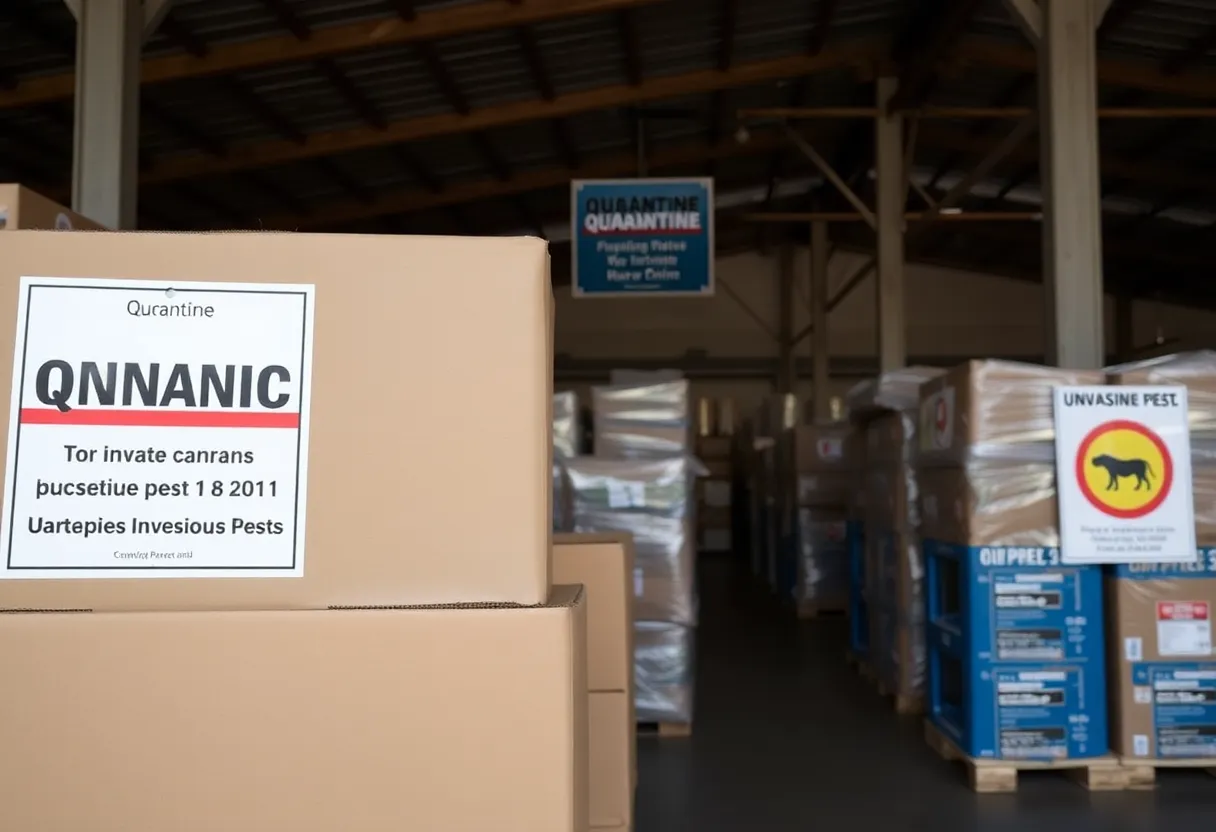Tucson, October 18, 2025
Arizona agriculture officials have reported the first detection of the invasive Khapra beetle in the United States, found in a warehouse shipment in Tucson. This pest poses a serious threat to stored grains, prompting immediate quarantine measures and heightened inspections across the state. The Khapra beetle, known for rapid reproduction and destruction of food supplies, could have devastating effects on local agriculture if not contained.
Tucson, AZ – First U.S. Detection of Invasive Khapra Beetle Sparks Urgent Quarantine
TUCSON, AZ (October 18, 2025) – Arizona agriculture officials have confirmed the first-ever detection of the invasive Khapra beetle in the United States, uncovered in a warehouse shipment arriving in Tucson from abroad. This small but destructive pest poses a severe threat to stored grains and could wreak havoc on local farms if it establishes a foothold. In response, authorities have immediately implemented quarantine measures around the affected site and intensified inspections at ports of entry across the state to prevent any potential spread.
The discovery was made during a routine inspection of imported goods at a Tucson warehouse, where officials identified the beetles infesting cargo materials. The Khapra beetle, scientifically known as Trogoderma granarium, is notorious for its ability to rapidly multiply and destroy stored food products like wheat, rice, barley, and other grains. Unlike common pantry pests, this beetle can remain hidden in cracks and crevices for years, making early detection challenging. A single infestation could lead to billions of dollars in losses for the agricultural sector, as the beetle’s larvae feed voraciously on grain kernels, rendering them unfit for consumption or sale.
Upon confirmation of the find, the Arizona Department of Agriculture quickly isolated the warehouse to halt any movement of potentially contaminated items. Teams of inspectors are now conducting thorough sweeps of surrounding areas, including nearby storage facilities and transportation routes. All imported shipments linked to the same origin are under heightened scrutiny, with fumigation protocols activated where necessary. Statewide, ports of entry along the border and major cargo hubs have ramped up screening processes, including advanced scanning technology and manual examinations, to catch any similar threats before they enter the food supply chain.
Understanding the Threat
The Khapra beetle originates from regions in Asia, Africa, and the Middle East, where it has long been a major agricultural pest. It has been banned from entry into the U.S. since 1953 due to its devastating impact, but global trade has increased the risk of accidental introductions. In countries where it thrives, the beetle can cause up to 20% losses in stored grains annually, affecting food security and economies. For Arizona, a state with a robust farming community producing cotton, vegetables, and grains, the stakes are particularly high. Local farms near Tucson, already dealing with drought and other challenges, could face catastrophic damage if the pest escapes containment.
Agricultural experts emphasize that the beetle’s resilience adds to the urgency. Adults are short-lived and rarely move far, but females lay hundreds of eggs on food sources. The larvae, which can survive without food for over a year, are the real danger—they bore into packaging and contaminate vast quantities of product. Past outbreaks in other nations, such as India and Australia, required years of effort and millions in costs to eradicate, underscoring why swift action is critical here.
Broader Implications for Arizona and Beyond
This incident highlights vulnerabilities in international supply chains, especially as trade volumes grow. Arizona’s position as a key entry point for goods from Mexico and beyond makes it a frontline in pest surveillance. Officials are collaborating with federal agencies to trace the shipment’s path and notify international partners, ensuring a coordinated response. Farmers and warehouse operators in the region are being advised to enhance their own monitoring, using traps and clean storage practices to support the official efforts.
While the immediate focus is containment, long-term strategies may include updated regulations on imported cargo and increased funding for detection tools. The event serves as a wake-up call for the industry to prioritize biosecurity, protecting not just Arizona’s agriculture but the national food system. As inspections continue, there are no reports of spread beyond the initial site, but vigilance remains essential to safeguard communities reliant on stable grain supplies.
Residents and businesses are encouraged to report any suspicious insect activity in stored products to local agriculture offices. This proactive detection in Tucson could prevent a wider crisis, demonstrating the effectiveness of ongoing border and warehouse checks. With quarantine and inspections in full force, officials are confident in their ability to neutralize this threat before it escalates.
FAQ
What is the Khapra beetle?
The Khapra beetle is an invasive pest that threatens stored grains and could devastate local farms if it spreads.
Where was the first U.S. detection of the Khapra beetle confirmed?
Arizona agriculture officials confirmed the first U.S. detection of the invasive Khapra beetle in a Tucson warehouse shipment from abroad.
What measures are in place following the detection?
Quarantine measures are in place, with inspections ramped up at ports of entry statewide.
Why is the Khapra beetle a threat?
The Khapra beetle threatens stored grains and could devastate local farms if it spreads.
Key Features of the Khapra Beetle Threat
| Feature | Description |
|---|---|
| Detection Location | Tucson warehouse shipment from abroad |
| Significance | First U.S. detection of the invasive Khapra beetle |
| Primary Threat | Threatens stored grains and could devastate local farms if it spreads |
| Response Actions | Quarantine measures in place, inspections ramped up at ports of entry statewide |




